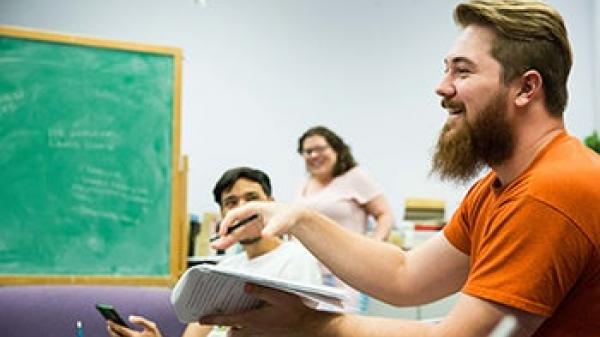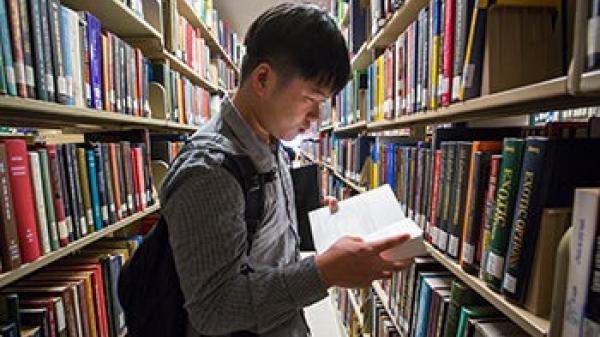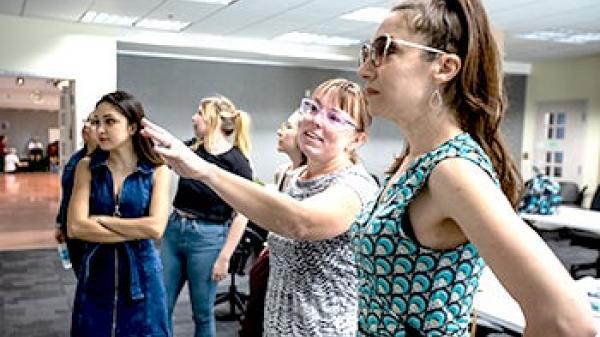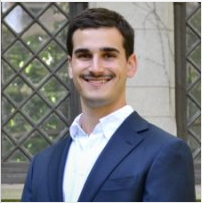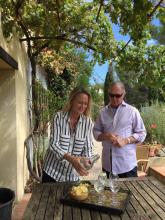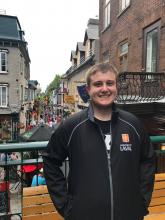Overview
The French program at ASU offers a wide range of courses in the language, literature, film, theater, culture, history, and art of the French-speaking world. Our courses encompass not only France and Europe, but also Africa, North America, and the Caribbean. Our faculty includes leading researchers and award-winning teachers. Many of our classes are small seminars that allow for extensive contact with professors. We offer a great deal of support through our faculty advisers, advising staff, and senior student mentors.
A French major will open many doors for your post-graduation career. French is one of the most spoken and useful languages in the world, and French-speaking countries represent a huge and rapidly growing portion of the world economy. French is useful in a wide variety of fields, from
- Teaching
- Marketing
- Gastronomy
- Fashion
- Translation
- Tourism
- International aid
- Finance
- Medicine
- New media
- Aerospace
Recent graduates of the ASU French program have joined the Peace Corps, taught English in France through the TAPIF program, worked for the State Department, received Fulbright fellowships, and found careers in fields such as marketing and lifestyle management, to name a few.
Even in careers not directly related to French, a background in French demonstrates a willingness to confront challenges, sensitivity toward global cultures, and the ability to think critically: skills that are all valued highly by potential employers.
ASU also offers numerous affordable opportunities to study abroad in French-speaking countries for the summer, semester or year, including a faculty-led summer program in Lyon, France. ASU is a leader in the number of students who win scholarships like Fulbright, Boren/National Security Education Program (NSEP) and Gilman scholarships.
At ASU there are also plenty of opportunities to engage with French and Francophone culture outside of the classroom. The French Club is active throughout the year, with weekly meetings, outings to local restaurants and markets, and movie nights. The French Club is a great way to meet other students and to get to know the international side of Phoenix. There is an Alliance française in Phoenix that frequently organizes French-related events. Phoenix has a Sister Cities relationship with Grenoble, France, and offers internship opportunities in Grenoble to ASU students.
French is also popular as a concurrent major, with students connecting their study of French to:
- Education
- Business
- Design
- Lingustics
- Public health
- Medicine
- Fine arts
- Aerospace engineering
Whatever your personal and career interests might be contact our advisors, ASU's French program can help get you there!
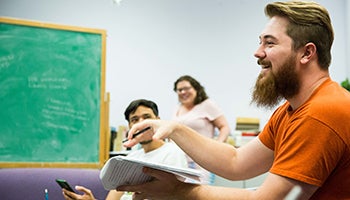
Bachelor of Arts in French
Learn one of the most widely spoken and important languages in the world. Study abroad in fascinating places and encounter many different cultures. Your experiences as a French major prepare you for a variety of creative and international professions.
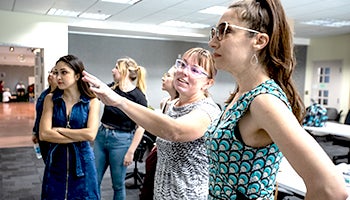
Minor in French
Learn one of the most widely spoken and important languages in the world and explore many different cultures. French learners can study abroad in fascinating places and are prepared for a variety of creative and international professions.
Outreach Programs
French Club a ASU We're a blossoming club on the Tempe campus devoted to developing one another's skills and awareness of French through fun events that are celebratory of the culture.
Alliance Française: There is an Alliance française in Phoenix that frequently organizes French-related events.
French-Italian Picnic: Occurs every semester as a community event for our French and Italian students. We invite friends and family to join us in celebrating French and Italian culture.
French Language and Québécois Culture in Québec, Canada Students looking for French immersion head to Canada on a budget for this prestigious yet affordable exchange program in Québec, Canada at Laval University.
French Language and Culture in Lyon, France The intensive French language and culture summer program in Lyon is designed to provide students with a true immersion experience. Because Lyon has far fewer tourists than other French cities, students have greater opportunities to utilize French language skills by interacting with locals and learning from native speakers.
Check out our study abroad trips in SILC.
Sister Cities: Phoenix has a Sister Cities relationship with Grenoble, France, and offers internship opportunities in Grenoble to ASU students.
The ability to speak another language opens up more opportunities for scholarships and fellowships. Take a look at our SILC scholarships. ASU also offers an extensive database for you to search through and find the right ones to apply for.
In the Study Abroad Office, Shira Burns oversees applications to programs. Study Abroad’s deadlines for applying for all programs are September 25th for the spring and February 15th for the fall. ASU financial aid is accepted for all programs on Study Abroad’s approved list.
Here is a list of a few scholarships specific for language:
- Fulbright
- Boren
- Benjamin A Gilman International Scholarship
- USAC Study Abroad Scholarship
- Stohl International Undergraduate Research Scholarships
Fellowships and Internships
- U.S. Department of State has a student internships program through Pathways.
- Thomas Perking Undergraduate and Graduate Foreign Affairs Fellowship
- European Union Internships in Europe.
- European Union Internship in the United States.
- Cultural Ambassador Program
People
Faculty
Alumni Stories
Name Kerry LePain
Graduation year 2012
Double Major French, History with additional concentration in Portuguese
What's your current job?
I just left my previous job to pursue an MA in Latin American Studies at the University of Chicago. I was previously working as a project manager for a textile designer in Paris, France. We produced woven metal textiles for interior architecture projects (luxury brands, yachts, hotels, etc) around the world.
How does language and culture help you succeed in your career?
I was working in a French company founded in Paris, so French was our day-to-day language of operation. Because we did 80% of our projects internationally, I did quite a bit of translation from English to French for the company and also used Italian and Portuguese on an occasional basis.
Did you study abroad? If so, can you speak about your experience?
I studied for an academic year in São Paulo, Brazil. It was an incredibly formative experience, both as my first time living in a foreign country and my first time living my life in a foreign language. It still influences me today and was the catalyst for my upcoming master's program and my future career goals.
How did ASU and the language program at SILC prepare you for your future?
First and foremost, I was fortunate to have an ensemble of really stellar professors who encouraged me and accompanied my thesis writing process. I think the ability to study multiple languages and have that fit into my curriculum was quite advantageous because working in a place like Europe, speaking more than just two languages is a huge asset. I took a variety of classes in foreign languages, not just culture-related, but also incorporating aspects of political science and economy. This really prepared me for life as a working professional abroad rather than just an appreciator of foreign cultures.
What was your favorite thing about learning a language?
A sense of discovery. Every time I start learning a new language, I feel like the slate is wiped clean, and I start to get connecting dots. It's also an amazing feeling when you see a word in English or a phrase that the foreign language has helped you to understand in a different way. I see many words in English and can interpret them differently or see their history because of Romance language knowledge. It's great.
Any advice for current language studies students?
Keep going with it. People will often question why you're studying a foreign language because they haven't traveled or really understood the benefits of it. People told me French wouldn't get me anywhere, but I've lived in Paris for the past three years and met amazing people doing it and traveled and experienced so much. The ability to relate to entirely different populations of people in new ways is one of the most worthwhile things you can study.
What's your current job? What inspired you to write your book?
For 15 years now, I have blogged from my home in France. It is a dream job, one I could not have imagined back at ASU, in 1989, when friends and family asked, "What will you do with a French degree?" Professional blogging did not exist then.
Keeping up with French Word-A-Day, my online language journal, helped me to realize I had a passionate subject to share, so you could say it was blogging that inspired me to publish books. My Words in a French Life, was published by Simon and Schuster in 2006, followed by Blossoming in Provence.
How does language and culture help you succeed in your career and/or daily life?
It provides a lot of grist for the writing mill! Though I have lived half my life in France, there are still times when I feel like a fish out of water. Nowadays, instead of becoming frustrated, I write about it - using my knowledge of the French language to help illustrate these stories of French cultural differences.
Did you study abroad? If so, can you speak about your experience?
Yes! In 1989 a caring teacher, Madame Wollam, encouraged me to sign up for the program in Lille. It changed my life! I stayed with the most adorable family, who took me under their French wings. I had the chance to experience authentic French life thanks to these down-to-earth hosts, the Bassimon family, who took me along to social engagements and included me in their daily life.
How did ASU and the language program at SILC prepare you for your future?
By encouraging me to seize opportunities to grow in the language. After my study-abroad program ended, I did not want to return home right away, as I knew I was not done learning in France. This time it was Dr. Wollam (my professor's husband, head of the language department) who supported my writing project, allowing me to report on my extended stay in exchange for class credit.
What was your favorite part about learning a language and its culture?
Being able to meet someone I may never have had the chance to know. If you want to go beyond tourism--to the heart of the French and their colorful personalities, you must persevere in the language! Every new word learned is a step closer to appreciating all the wonderful characters here, on every park bench, in every bakery line, at every market stand...
Any advice for current language studies students?
Don't worry about what you will do with your degree! Think of the bigger picture -- and all of the doors a second language will open up! For me this has led to a meaningful life--and an exciting career--in France!
ASU student becomes a language professional at the School of International Letters and Cultures
By Gabriel Sandler — February 27, 2018
Arizona State University's School of International Letters and Cultures (SILC) not only draws people passionate about global life, but gives those people a chance to begin their global careers. Ralph Stage, a French major, has taken on many of these opportunities.
“I am a SILC ambassador intern,” Stage said. “My job is to help find academic internships and opportunities through the community, the Phoenix metro area, to help promote foreign language study and multicultural exposure.”
In addition to working for the school directly, Stage is also president of the French Club, helping other students improve their own language proficiency. Stage works as the treasurer of the SILC Attachés and helps organize SILC Café, supporting the weekly get-together for students of different language and culture studies to share what they’re doing.
For Stage, his interest in global studies came from his mother, who learned French in the Peace Corps. In high school, Stage would also study Spanish, but French was in the family. Between his French-speaking babysitter and a bilingual elementary school, he developed a strong language background, enabling him to maximize his time at SILC.
“I did the study abroad program in Quebec, Canada, I’ve been to Mexico, Guatemala, Dominican Republic, Guadalupe, Burkina Faso, Italy, France, London,” Stage said.
“It was really cool to go around the world and see how other people lived, how they interacted with each other,” Stage said. “When I was in Burkina Faso, Africa, I got to speak French with some of the people there … in Quebec it was a full immersion program, so it helped my language skills quite a lot.”
Across nations, Stage found that his ability to communicate directly gave him deeper experiences day to day. Whether it was better restaurants, better exploring or better local friendships, speaking the language let him “interact with the community in a way that you couldn’t get from a tourist brochure.”
Back in Phoenix, Stage’s improved language skills are increasingly useful. Stage plans to get involved in refugee resettlement and prepare to teach abroad, opportunities he’s learned more and more about through SILC. He has immersed himself in an intricate and diverse multilingual community.
“You’d be surprised what you’re missing out on by sticking to just English,” Stage said. “It’s a big world out there, with a lot of great things to check out … you’ll probably find out you love it.”

